Baha'i Community of Kingston
Celebrate Ayyám-i-Há: Days of Joy and Giving
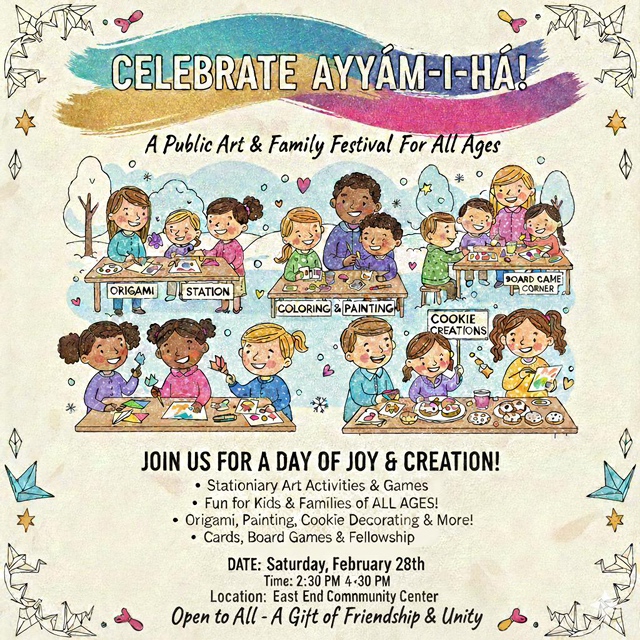
Ayyám-i-Há, or the Intercalary Days, is a special time in the Bahá’í calendar dedicated to joy, generosity, and community spirit. These four or five days fall just before the Bahá’í month of fasting, usually in late February or early March. During Ayyám-i-Há, Bahá’ís celebrate by sharing with others, giving gifts, helping those in need, and enjoying time with family and friends. It’s a time to reflect on the blessings in our lives while preparing spiritually for the month of fasting that follows. The timing of Ayyám-i-Há is also important in the Bahá’í calendar. Since the year is made up of nineteen months of nineteen days, a few extra days are needed to match the solar year. These “extra” days are Ayyám-i-Há—a perfect pause for celebration and community connection. Whether through acts of service, a small gathering, or simple kindnesses, Ayyám-i-Há encourages everyone to spread joy and generosity in their communities. Contact us to discover more about different events organized by the Baha'i community in your area.
Monthly Conversations on Building Vibrant Communities
Throughout Kingston, people are building a pattern of community life that responds to the vision of a better world. This is a vision in which everyone has a role to play: People of all ages and backgrounds share a common purpose to promote the well-being and prosperity of the whole community. They are committed to learning in action, as they strive to integrate worship and service to the common good within a shared social life. These conversations on community-building explore insights about fostering a pattern of vibrant community life and how prayer and efforts to apply spiritual principles to one’s daily life provide the seeds for social betterment. Special emphasis is placed on the role of children and youth. They are the most precious treasure a community can possess, for in them are the promise and guarantee of the future. While parents have special responsibilities to children within the family unit, children are born into the trust of the community, and their well-being and moral development is the shared concern of all its members. These conversations are brief presentations followed by a moderated, open, and candid discussion and take place on the first Sunday of each month at 2 pm at The Spire, 82 Sydenham Street, Kingston ON in the Lower Hall room 109, with light refreshments served. All are welcome to join, participate, and be part of building vibrant communities in Kingston.
Contact us to discover more about upcoming Fireside/informal discussions.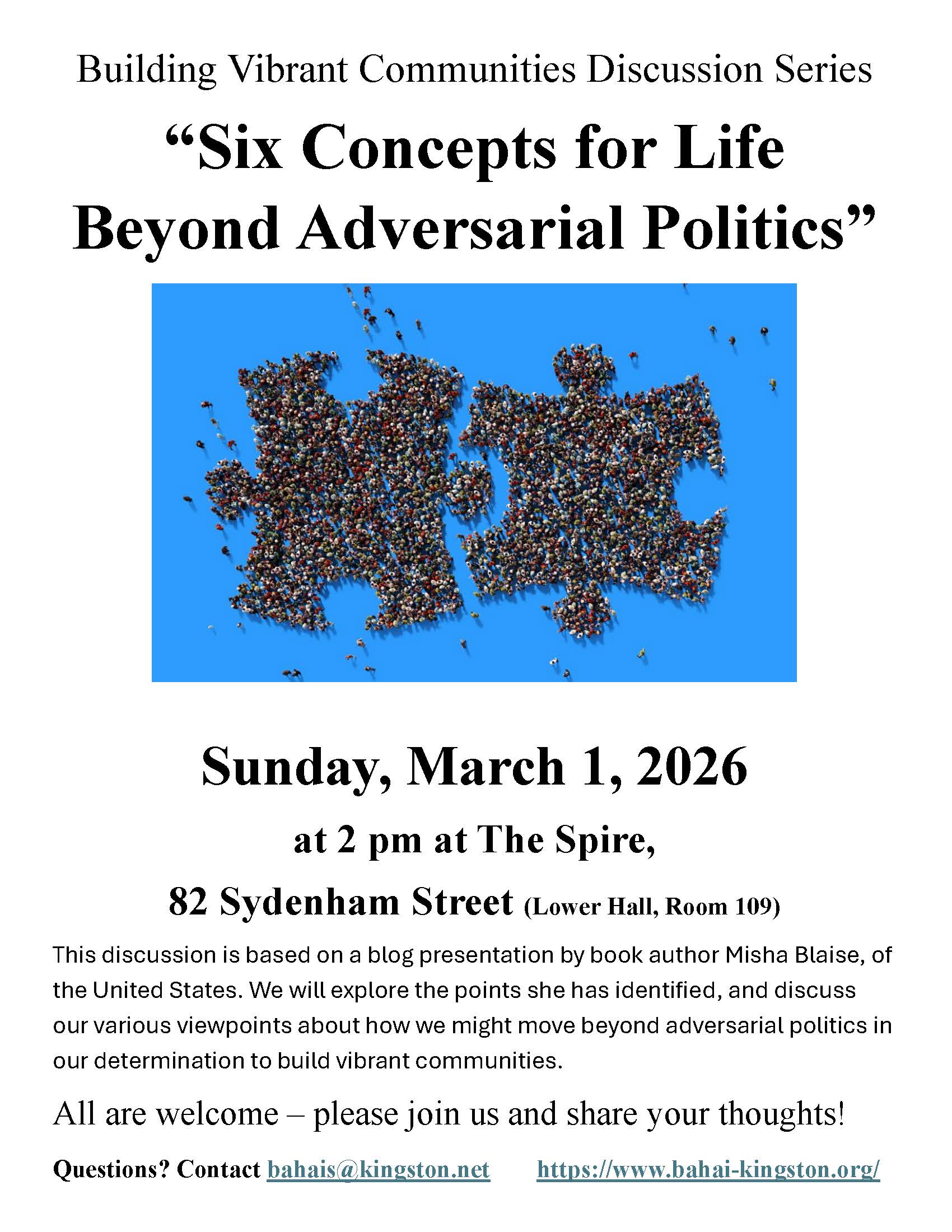
Baha'i Community of Kingston
Community Life
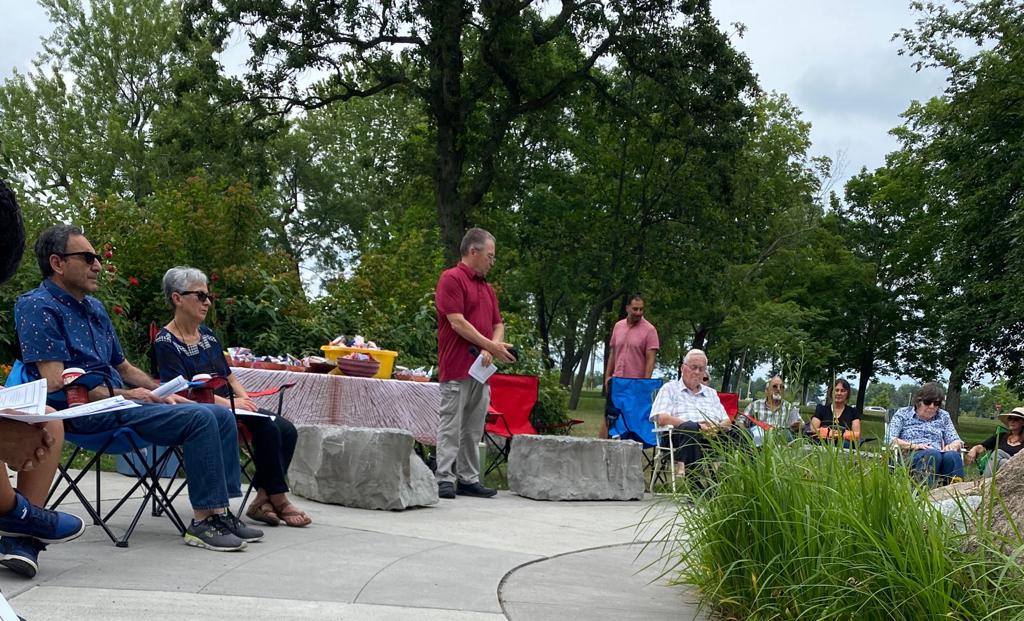
Devotional Life
In addition to personal prayer and meditation, Bahá'í communities hold regular devotional gatherings for collective worship. These gatherings unite people in prayer and awaken their spiritual susceptibilities. Because there are no ritual and no clergy in the Bahá'í Faith, devotional gatherings are often held in peoples’ homes or in public places and they are diverse in their form. Prayer and reflection upon sacred scriptures is at the heart of such programs, and music, Devotional Gathering Music singing, poetry is often incorporated as well. These gatherings are held in every Bahá'í community to nourish a pattern of life characterized by its devotional character. The spiritual Bahá’ís believe the crucial need facing humanity is to find a unifying vision of the future of society and of the nature and purpose of life. Such a vision unfolds in the writings of Bahá’u’lláh. atmosphere created within a devotional meeting imparts a sense of joy, fellowship and love that enriches the relationships among participants. Bahá'í devotional gatherings are intended to embrace the attitude of prayer and practice of devotion that is universal to all religions, and they are open to people of all beliefs and backgrounds. Contact us to discover more about devotional gatherings in your area.
Family and Children
Bahá'í children’s classes are offered to all children between 6 and 10 years old for their spiritual education and moral development. The aim of these classes is to inspire in each child a love for our diverse human family and to cultivate a praiseworthy character. They are guided by the Bahá'í belief that children are noble beings with great potential to develop into upright and active participants in their community. Children’s classes awaken an understanding and love for the messengers of God and humanity’s collective spiritual heritage. Stories, games, arts, and songs are the main methods of instruction. At the heart of these classes is the belief that the education of children is essential to the future development of our communities. That is why Bahá'í children’s classes convey an appreciation of the arts, respect for science, and a focus on empowering spiritual education. Teachers are trained to see each child as a mine rich in gems, and to convey an all-embracing love of children. Contact us to discover more about children’s classes in your area.
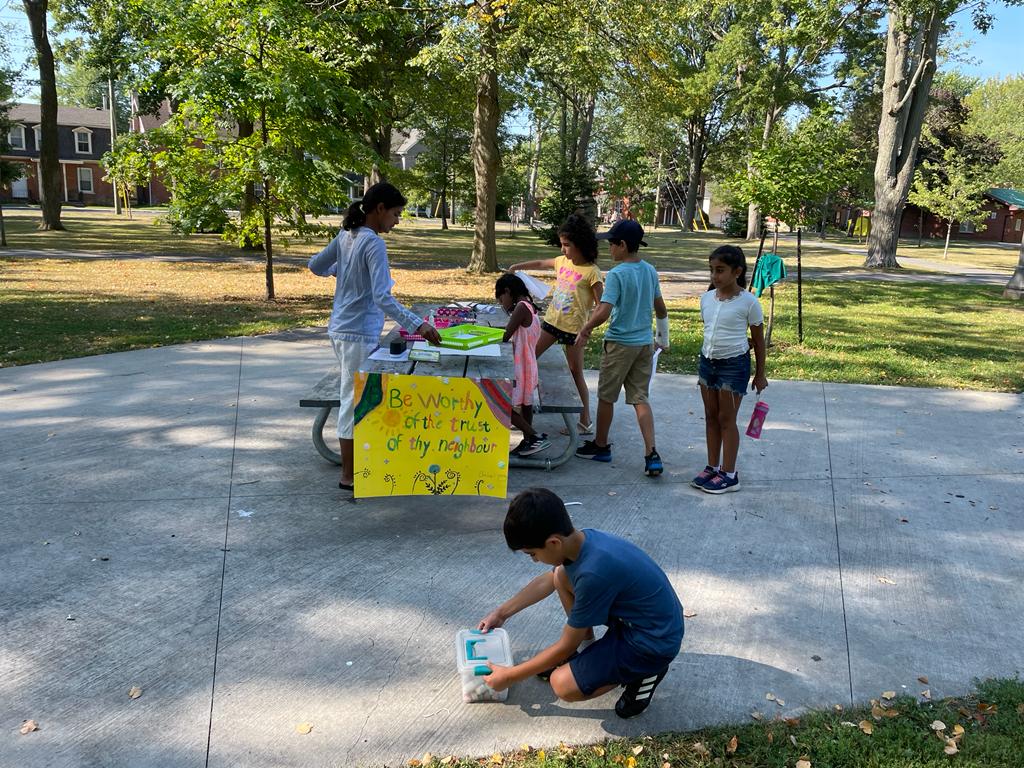
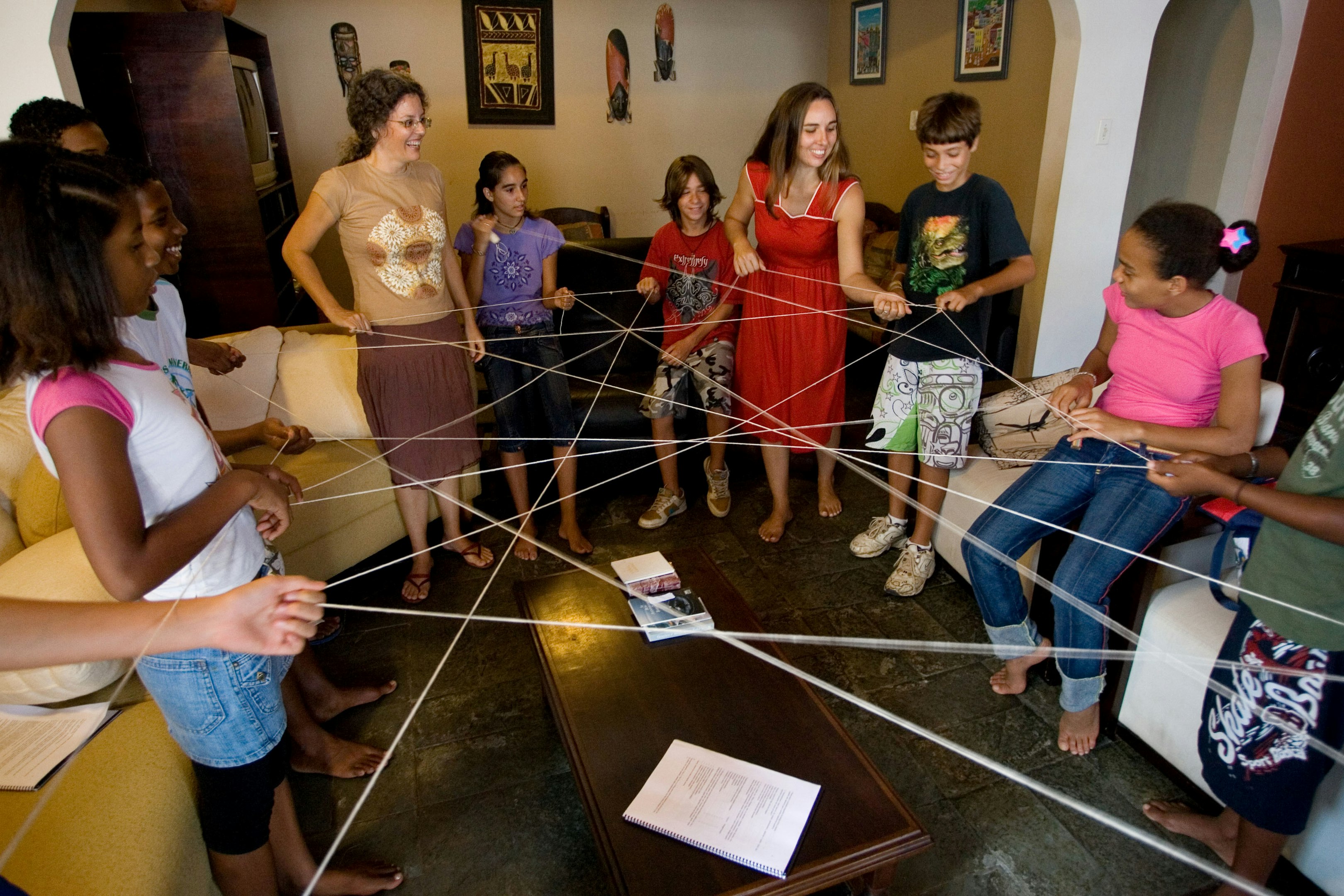
Junior Youth
Junior youth – or those between 11 and 14 years – are at a crucial stage in their lives when they are defining their identity and values. Junior youth groups offered by the Bahá'í community address the needs of these young people by helping them to develop a strong moral identity and to empower them to contribute to the well-being of their communities. In these groups, trained animators use creative activities to engage the interests of junior youth and mold their capacities for service. A curriculum of material designed for junior youth is used in tandem with drama, story-telling, visual arts, discussion of social issues, and acts of service to their community. These groups aim to develop a cohesive identity that revolves around optimism about the future, high ideals, and a sense of purpose about life. The animators of groups are trained in a sequence of courses that emphasizes the great potential of junior youth to understand social processes and to contribute towards building a more peaceful and just world. The training program also calls upon animators to reflect on their own moral purpose and to see leading a junior youth group as a path of service that contributes to their personal transformation. Contact us to discover more about junior youth groups in your area.
Walking a Spiritual Path
Study circles gather individuals to delve into the Bahá'í teachings through structured study, fostering reflection on moral purpose and service capacities. Participants engage in systematic discussions of passages from Bahá'í writings, covering topics like prayer, child education, and the lives of key figures in the faith. Each course equips participants with practical skills, such as organizing devotional gatherings or leading youth empowerment groups. Through action, reflection, and consultation, participants elevate their ability to serve their communities. Study circles cultivate an atmosphere of personal responsibility within a serious yet uplifting environment. Facilitated by trained tutors, these circles are a fundamental aspect of Bahá'í community life, aiming to instill a sense of accountability for community, national, and global advancement. They welcome individuals from all backgrounds and are conducted nationwide. Reach out to discover study circles in your area.
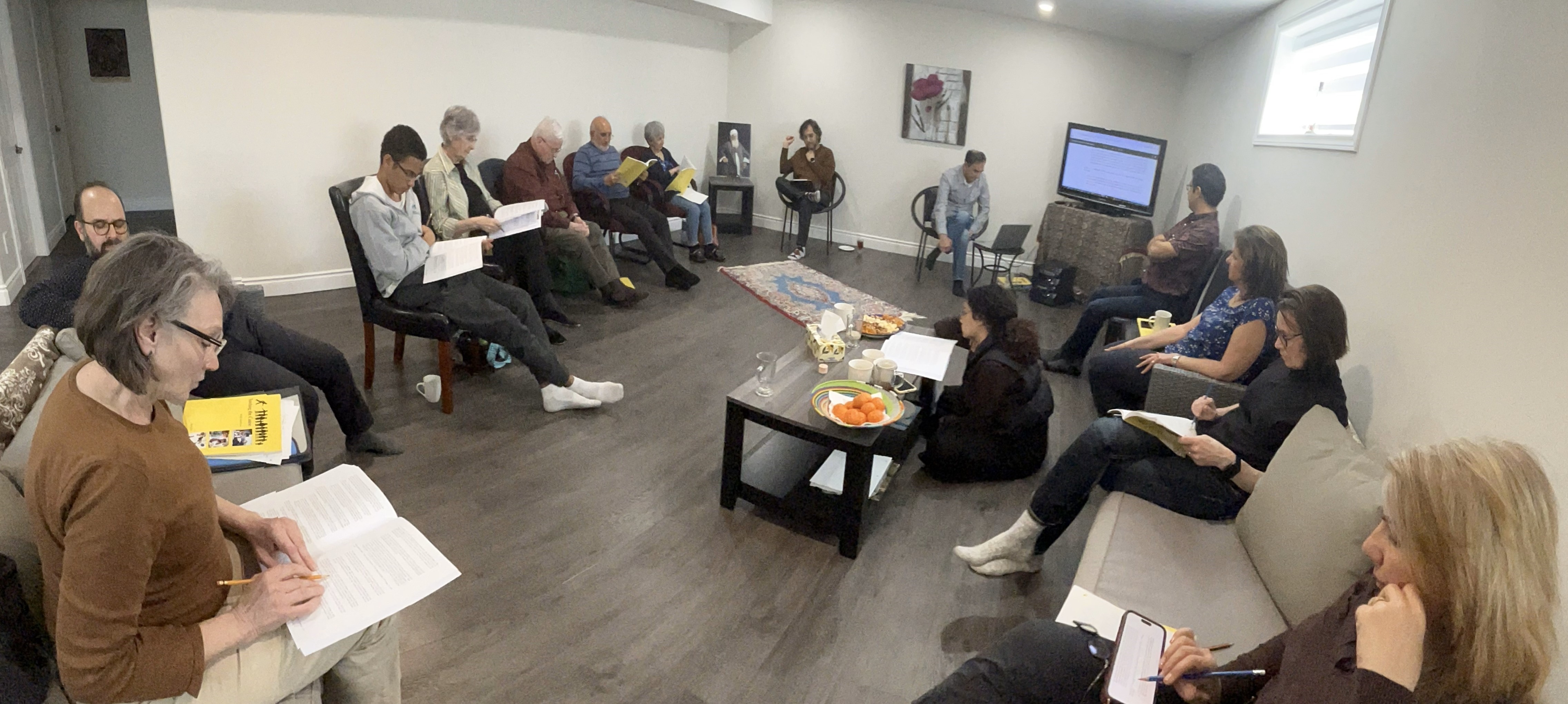
Baha'i Community of Kingston
Commuity News
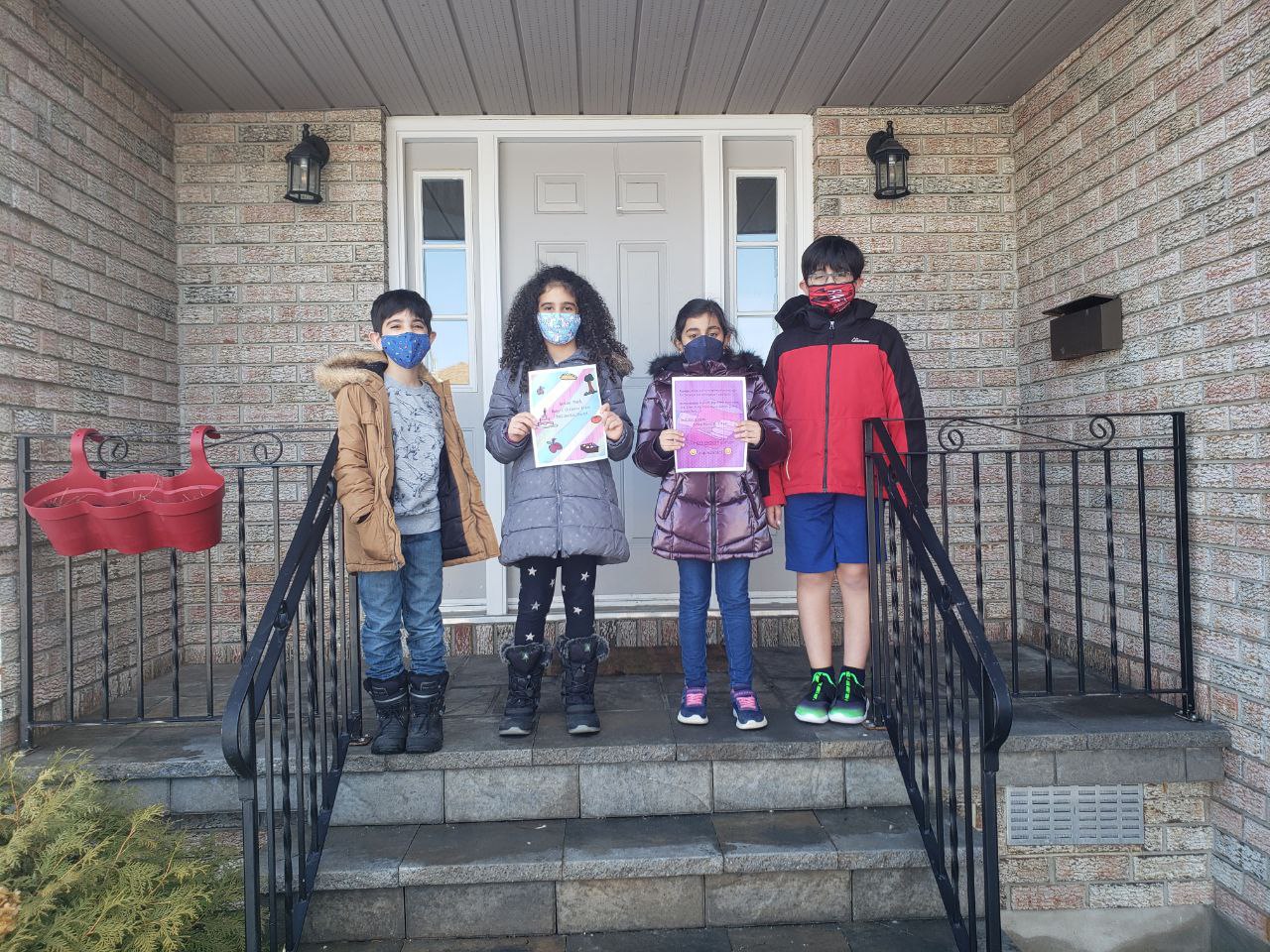
Kingston Baha'i Children's Class support the Kingston Food Bank
The Kingston Baha'i Children's Class, in the spirit of Ayyam-i-Ha decided to undertake a Food Bank project, focusing on the virtue of generosity. After working together and hand designing an invitation, they took advantage of the sunshine on March 6th to distribute the invitation to the homes in their neighbourhood which noted that they will be collecting non-perishable food items on Sunday, March 20th for the Kingston Food Bank. They were warmly welcomed by anyone who opened their door and were so graciously encouraged by all the neighbours who lovingly reminded them of the importance of their great service to the community and promised to support them when they came back to collect the food items. When picking up the food items the following week, each household that donated food received a card from the Children's Class thanking them for their generosity.
Kingston Baha'i Community Supports Martha's Table with Sock Drive
As part of the Kingston Frontenac Cluster's Ayyam-i-Ha celebrations, the community came together with great enthusiasm to organize a Sock Drive for Martha's Table. Situated within Kingston's social welfare network, Martha's Table stands as a beacon of hope, offering more than just nutritious meals; it serves as a sanctuary, a place where individuals experiencing hardships find solace, companionship, and unwavering support. The Community's collective efforts were nothing short of remarkable, as they poured their hearts into collecting essentials. The response was overwhelming, with generous donations pouring in, filling the back of a van with bags upon bags of warm socks and gently used winter coats. These contributions are not just material items; they represent warmth, comfort, and dignity for some of the most vulnerable members of our community. With winter's chill looming, these provisions will undoubtedly offer a lifeline to those in need, ensuring they are equipped to face the colder months with a renewed sense of hope and security.

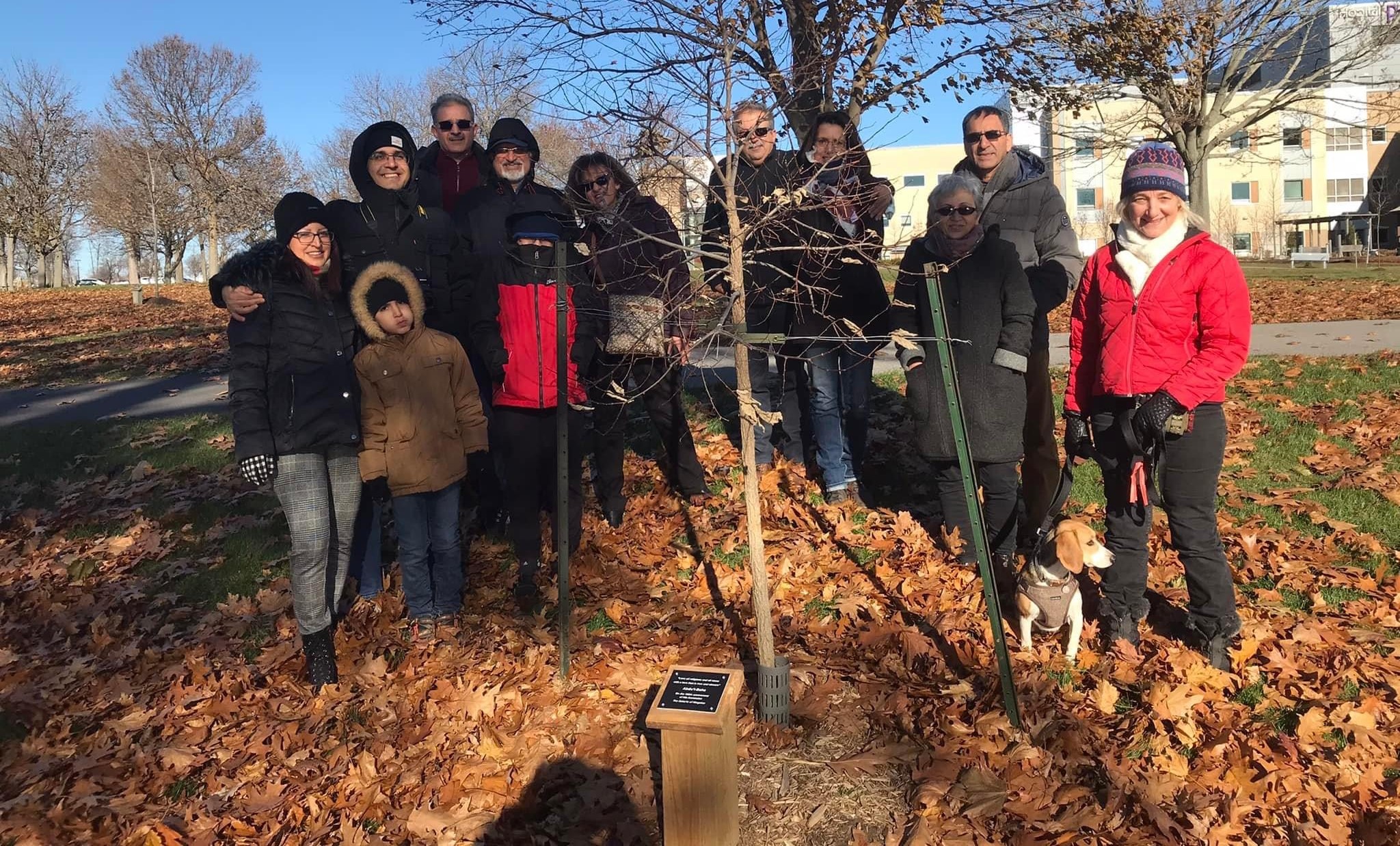
Honouring 100th Anniversary of the Ascension of Abdu’l-Baha
In honor of this year’s Holy Days and to commemorate the 100th Anniversary of the Ascension of Abdu’l-Baha, the Kingston Baha’i Community participated in the City of Kingston’s Memorial Tree program. This program allows the community to plant a tree in a public park as a beautiful way to remember a loved one or mark an event, contributing to Kingston's urban forest and providing shade for generations. The Memorial Tree, planted in October at Lake Ontario Park, the city's largest urban waterfront park, features a plaque inscribed with sacred words by Abdu’l-Baha. The plaque, mounted on a pedestal, reads “Love all religions and all races with a love that is true and sincere” Abdul’l-Baha On the 100th anniversary of His Ascension. The Baha’is of Kingston gathered at the park on November 27th at 1:00 p.m. to unveil the plaque and offer prayers.
Bahai’ Children and Youth participate in Kingston Interfaith Community’s Annual Multi-Faith Potluck
Each year, the Kingston Interfaith Community, which is a group comprised of various faiths and spiritual traditions annually holds a Multi-Faith Potluck dinner, as an opportunity for Kingstonians of all faith backgrounds to come together and share a meal over an evening of unity and fellowship. The program this year was organized by the youth of some of the faith groups, including a youth from the Baha’i, with the program focused on children and youth, who are key to seeing change in today’s troubled world. The Baha’i Children’s Class participated in the program, encouraging the audience to join them in a Baha’i song of unity.
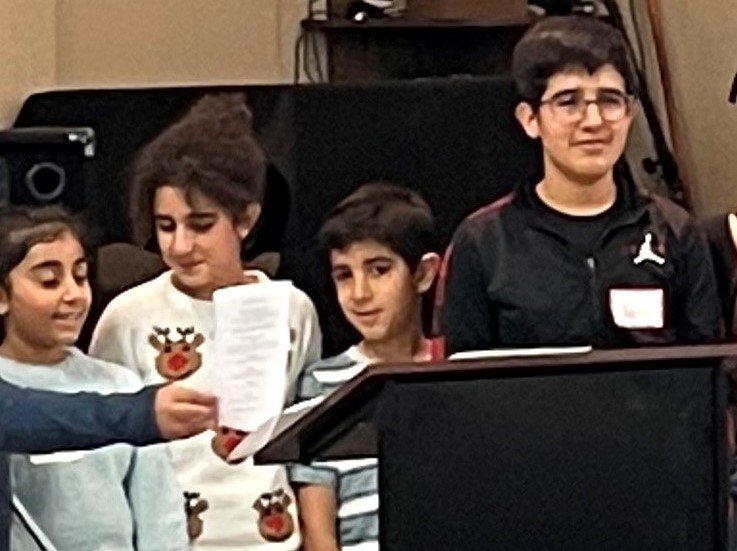
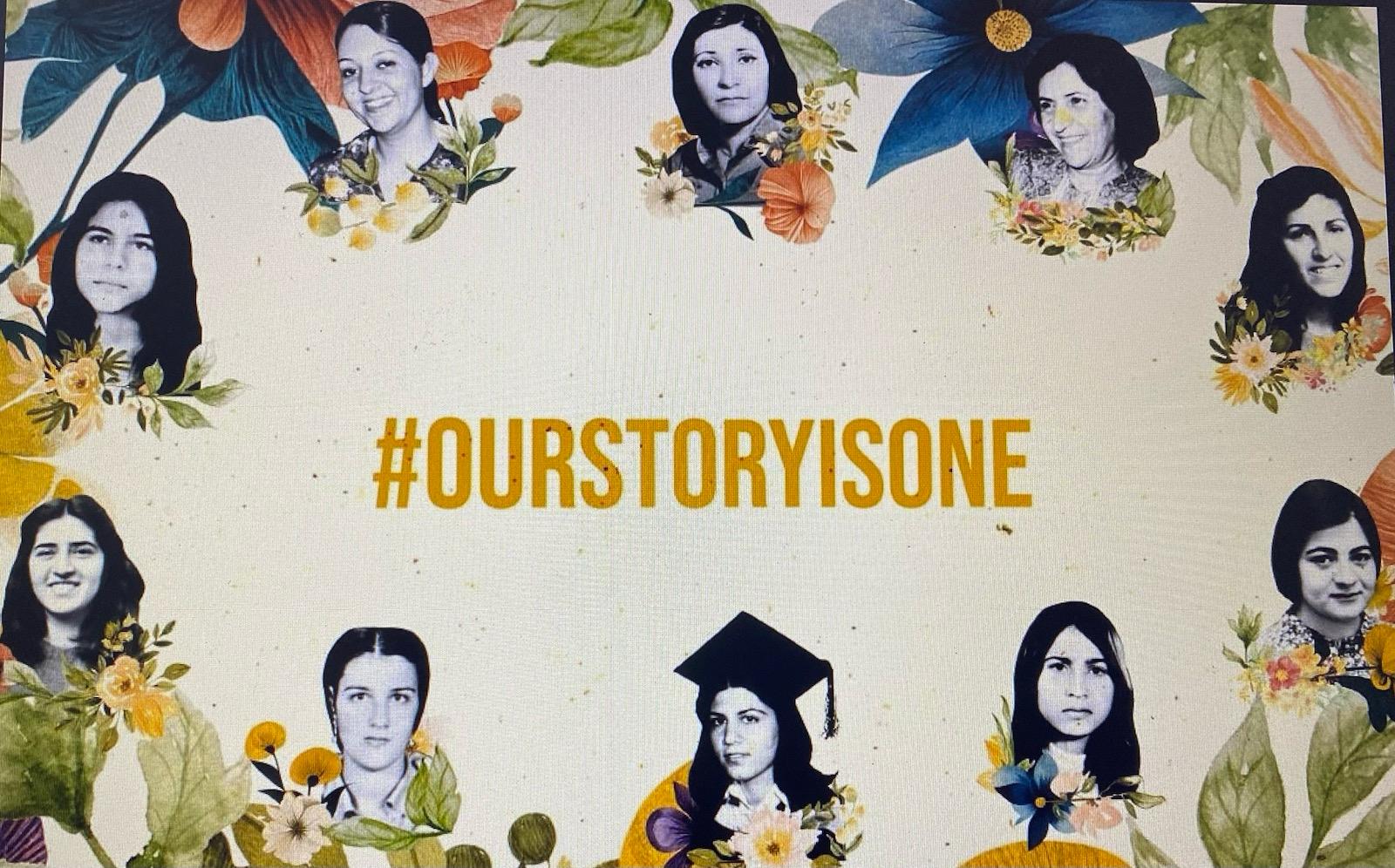
Our Story is One Campaign
June 2023 marked the 40 years since the tragic execution of 10 Baha’i women in Shiraz for choosing to stand up for their beliefs in justice and equality. Their story continues to echo in the resilient women of Iran who walk the same path, make the same choice. The difficult road to gender equality in Iran has been shared by countless women of all faiths and backgrounds. Our story of resilience in the face of oppression is #OurStoryIsOne one. The Baha’i community of Kingston invited Kingstonians to join them for a devotional gathering at the Spire on June 27th to honor the 10 Baha’i women in Shiraz, Iran, who were hanged for their belief in a faith that promotes gender equality, justice and truthfulness
Baha'i Community of Kingston
The Baha'I Faith
About the Baha'i Faith
Throughout history, God has sent to humanity a series of divine Educators—known as Manifestations of God—whose teachings have provided the basis for the advancement of civilization. These Manifestations have included Abraham, Krishna, Zoroaster, Moses, Buddha, Jesus, and Muḥammad. Bahá’u’lláh, the latest of these Messengers, explained that the religions of the world come from the same Source and are in essence successive chapters of one religion from God. Bahá’ís believe the crucial need facing humanity is to find a unifying vision of the future of society and of the nature and purpose of life. Such a vision unfolds in the writings of Bahá’u’lláh.
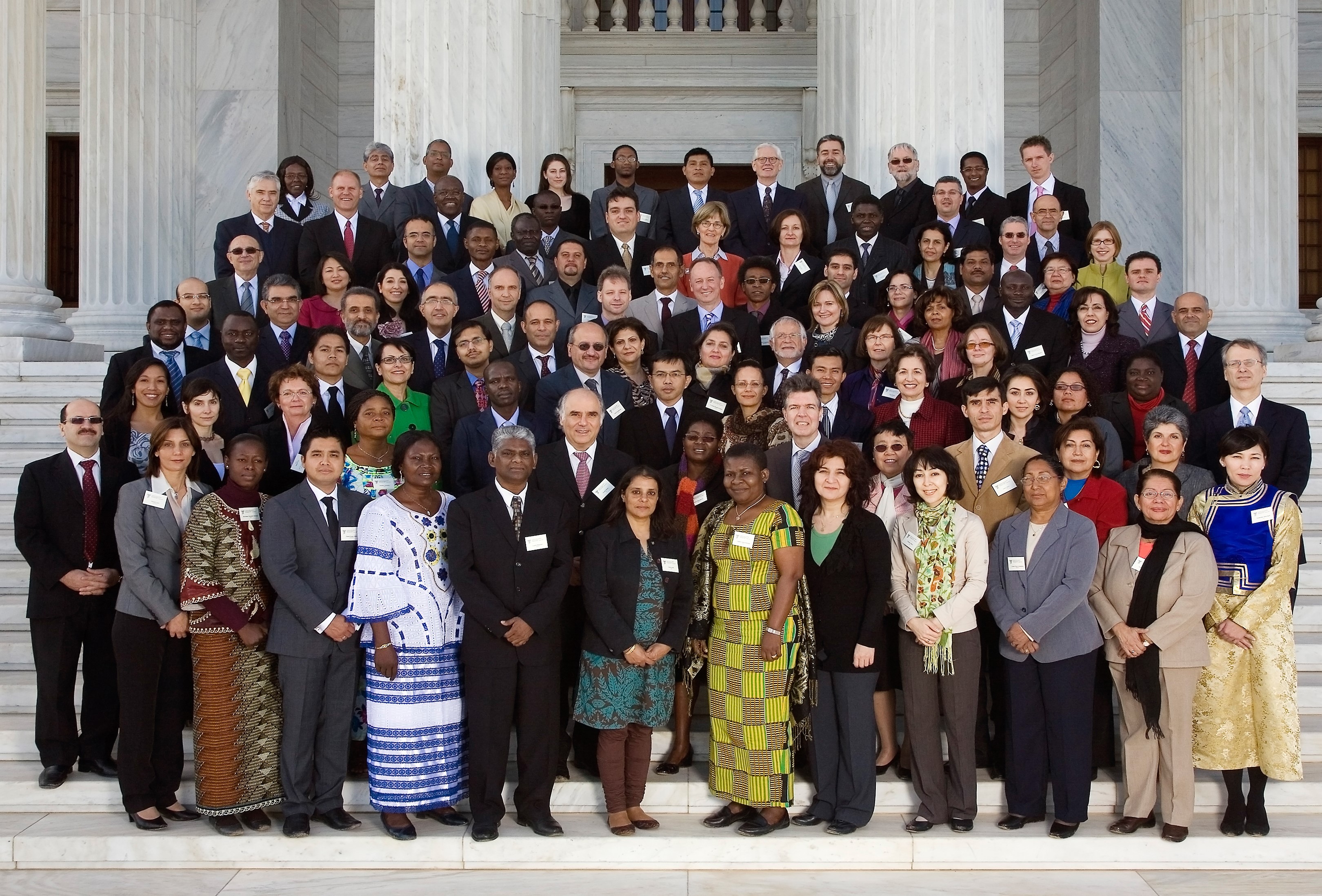
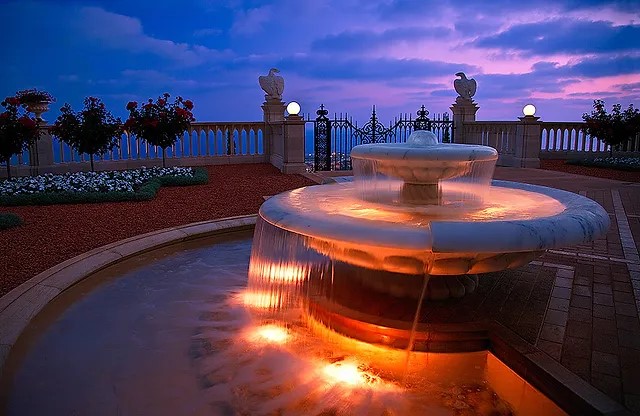
The Bahá'í Faith
The Bahá'í Faith, the youngest of the world's independent religions, was founded by Bahá'u'lláh (1817-1892), considered the latest in the lineage of Messengers of God including Abraham, Moses, Buddha, Krishna, Zoroaster, Christ, and Muhammad. Bahá'u'lláh's message emphasizes the unity of humanity and the emergence of a global society. He believed that historical forces, orchestrated by God, are dismantling barriers of race, class, creed, and nation to pave the way for a universal civilization. The main challenge is for people to recognize their oneness and contribute to the process of unification, a goal the Bahá'í Faith seeks to advance. With a worldwide community of approximately five million adherents from diverse backgrounds, the Bahá'í Faith strives to apply Bahá'u'lláh's teachings globally, offering inspiration to those who share the vision of humanity as one global family and Earth as our common homeland.
History of the Baha'i Faith
Bahá'u'lláh taught that there is one God, the same Creator recognised by the great religions of the world. He also taught that all the world’s major religions are successive stages in the ongoing revelation of the one Faith. This is often referred to as “progressive revelation”. We believe all the great religions come from the same Source, God, and have the same essential purpose - to guide and educate the human race. Their spiritual core is one, but they differ in their secondary aspects such as social teachings, which change in relation to humanity’s evolving requirements. The principle of the oneness of humanity is the pivot around which all the teachings of Bahá'u'lláh revolve. For this reason, Bahá'ís follow laws of personal morality and behaviour, as well as social laws and principles, all of which we see as promoting and establishing the oneness of humanity. We believe the purpose of life is to know and worship God, to acquire virtues and to carry forward an ever-advancing civilization. Once we die our soul progresses to the afterlife where it continues to develop spiritually.
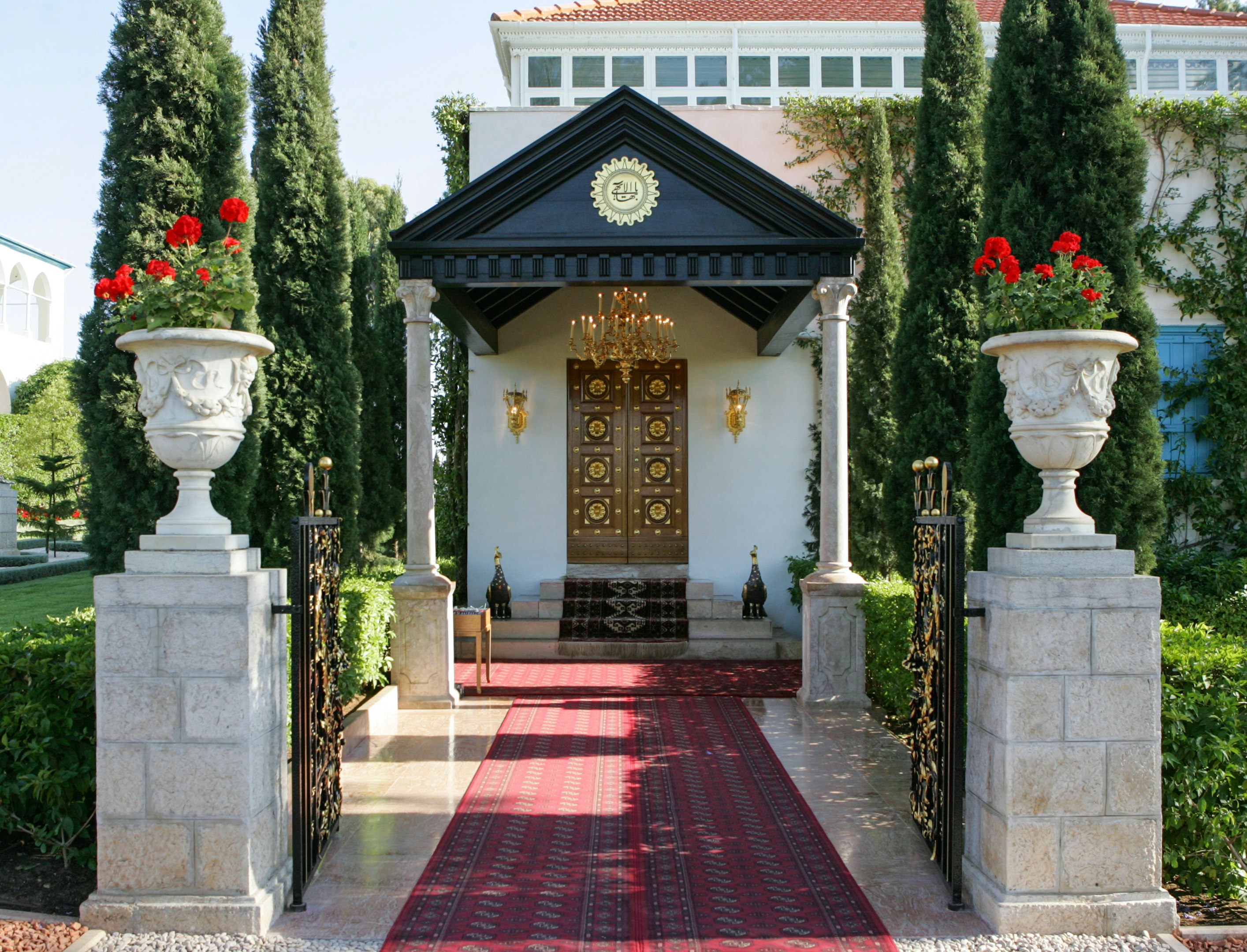
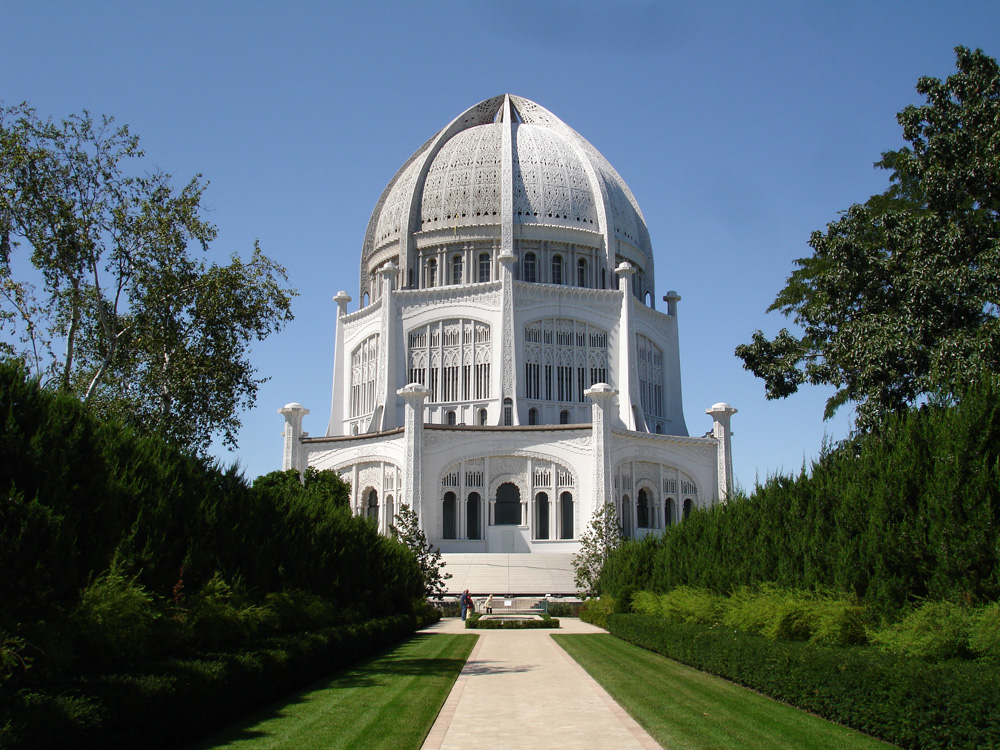
Bahá'u'lláh and The Báb
The Founder of the Bahá'í Faith was Bahá'u'lláh. His name means “the Glory of God.” We recognise Bahá'u'lláh as the Messenger of God for this age and the Promised One of all ages and religions. The Bahá'í Faith is founded on His teachings. Born in Tehran in 1817, Bahá'u'lláh spent most of His life unjustly exiled and imprisoned. His message of peace, unity and justice, and His prescription for the personal and social requirements of the future global society, form the basis of the sacred texts of the Faith. He was exiled to the Holy Land in 1868 and spent the rest of His life there. He passed away in 1892 in Acre, near Haifa in what is now Israel.
Bahá'u'lláh’s mission was heralded by the Báb (1819-1850), Whose name means “The Gate.” The Báb was an independent Messenger of God. His message urged religious and social reform and aroused great interest among tens of thousands of followers throughout Persia. The Báb was unjustly imprisoned for His teachings. In 1850 He was executed by firing squad.
'Abdu’l-Bahá
'Abdu’l-Bahá (1844-1921) played a crucial role in expanding and solidifying the Bahá'í Faith as Bahá'u'lláh's appointed successor and interpreter. Following Bahá'u'lláh's passing, 'Abdu’l-Bahá assumed leadership, guiding the Faith through a critical transition with wisdom and dedication. He significantly broadened the Faith's reach beyond its Middle Eastern roots by traveling extensively to Europe and North America, where he addressed diverse audiences in universities, churches, synagogues, and progressive associations. His lectures attracted large crowds and fostered understanding of Bahá'í principles of unity, peace, and social justice. Through his efforts, 'Abdu’l-Bahá inspired many to embrace Bahá'u'lláh's teachings and contribute to humanity's spiritual and social progress, leaving a lasting impact on the Bahá'í community and beyond.
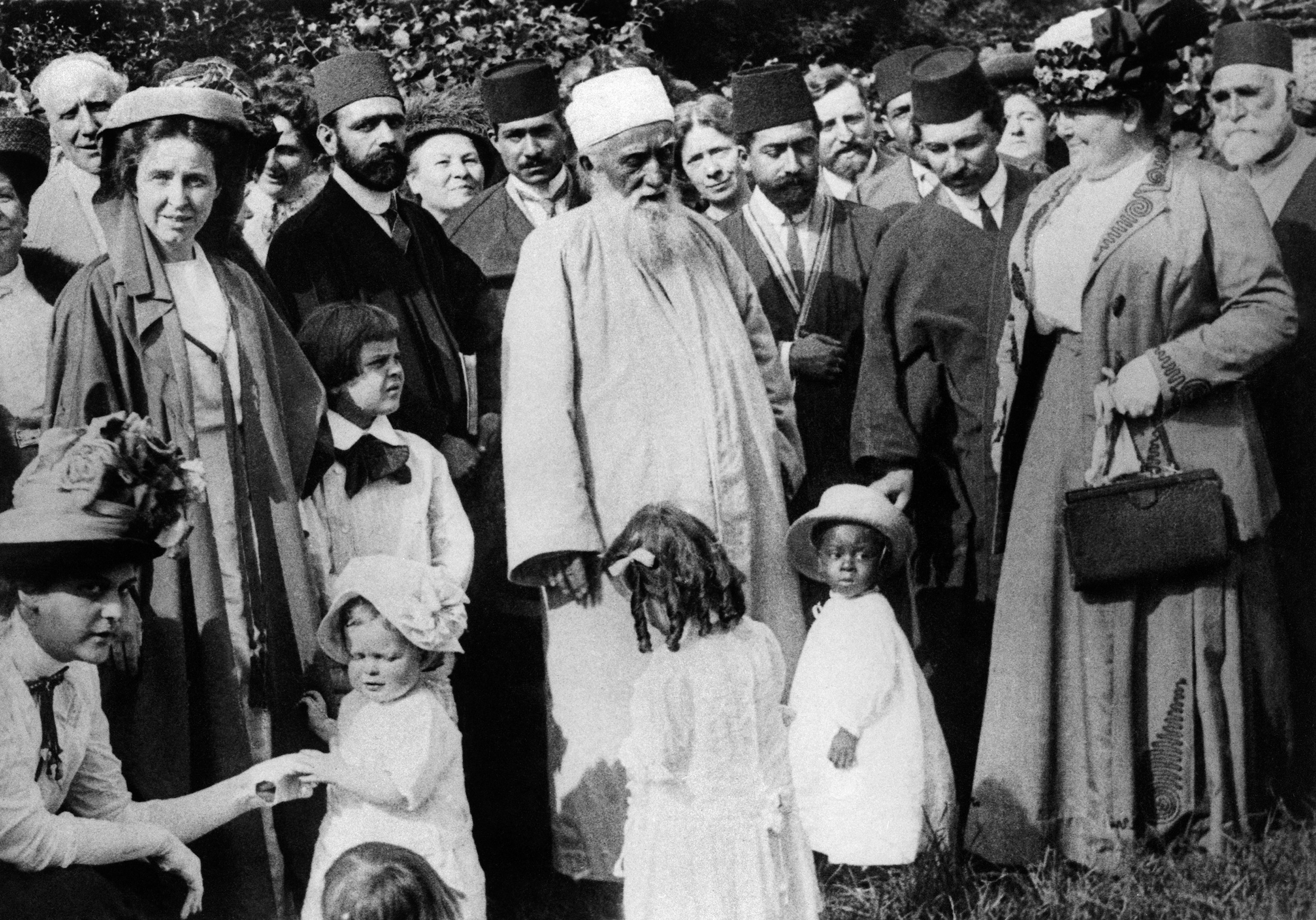
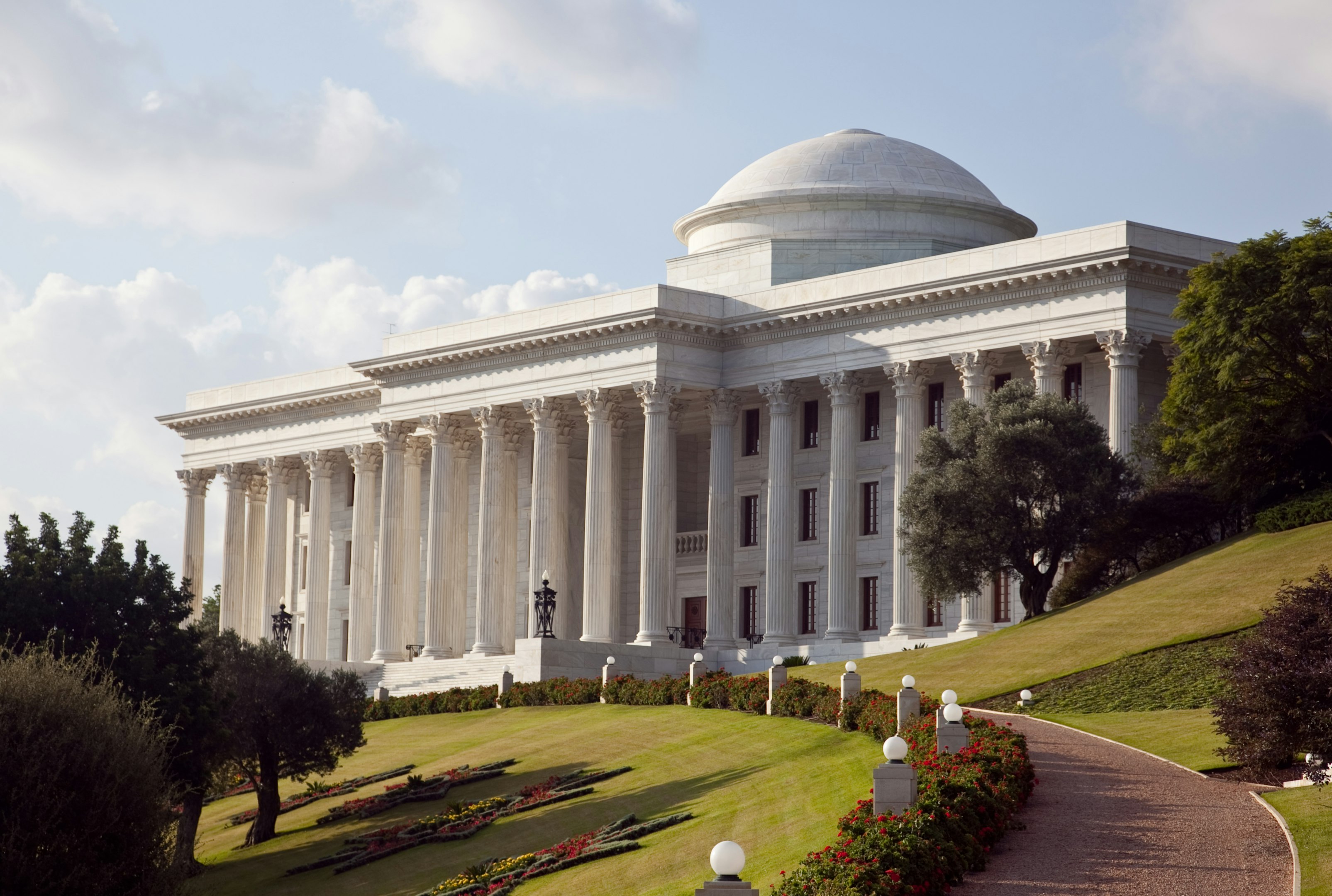
Shoghi Effendi
In His will and testament, 'Abdu’l-Bahá appointed His eldest grandson, Shoghi Effendi Rabbani (1897-1957), to succeed him as the head or "Guardian" of the Bahá'í Faith. Shoghi Effendi oversaw a major expansion of the Bahá'í Faith. From 35 countries in 1921, the Faith had spread to more than 200 countries, territories and colonies at the time of his passing in 1957.
Universal House of Justice
After the death of Shoghi Effendi, a small group of specially appointed individuals guided the development of the international Bahá'í community until the election of the first Universal House of Justice in 1963. The Universal House of Justice is the elected, supreme governing council of the Bahá'í Faith and has its permanent Seat at the Bahá'í World Centre in Haifa, Israel. As head of the Bahá'í Faith, the Universal House of Justice directs the spiritual and administrative affairs of the Bahá'ís of the world.
Teachings of the Baha’i Faith
Bahá'u'lláh taught that there is one God, recognized as the same Creator across major world religions. He emphasized the concept of "progressive revelation," viewing all religions as successive stages in unveiling the one Faith. These religions originate from the same divine Source, aiming to guide and educate humanity, though they may differ in secondary aspects like social teachings. The principle of the oneness of humanity is central to Bahá'u'lláh's teachings, guiding personal morality and behavior, as well as social laws, to promote unity. The purpose of life, according to Bahá'í beliefs, is to know and worship God, cultivate virtues, and advance civilization. Upon death, the soul progresses to the afterlife for continued spiritual development. For more information, please contact us or visit: http://info.bahai.org
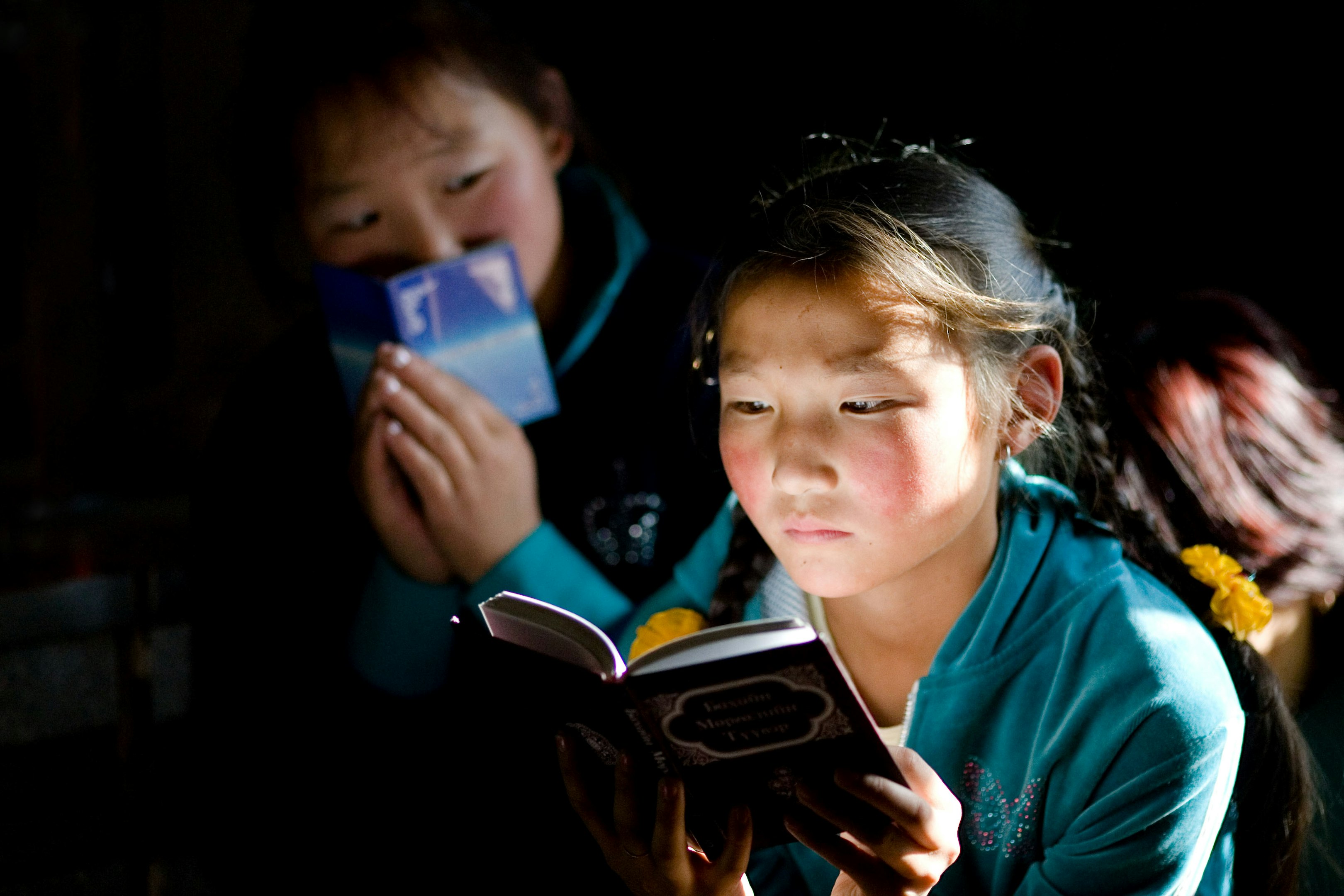
Baha'i Community of Kingston
EVENTS
Ayyám-i-Há Intercalary Days
Celebrate :Ayyám-i-Há Days of Joy and Giving, Saturday, February 28th from 2:30 PM to 4:30 PM, at East End Community Center, 779 Highway 15 Kingston
Please Contact us for further info.
Monthly Discussions on the 1st Sunday of each month
Sunday, March 1, 2026 at 2 pm, The Spire, 82 Sydenham Street
PleaseContact us for further info.
Contact
Contact Us
Our Email
bahais@kingston.net